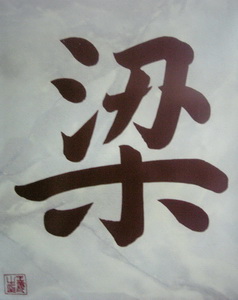Welcome to Atikomtrirat

Liang (Chinese: 梁) is a Chinese surname common in Taiwan and southern China. It is often transliterated as Leung or Leong (Cantonese), Neo / Nio / Niu (Hokkien, Teochew). It is also common in Korea, where it is pronounced Yang.
Chinese surname No. 128 "Liang". Liang means: a beam; a bridge; an elevation.
The Liang family name has been in existence for approximately 2600 years. The first Liang was Liang Kang Hou who was the ruler of the State of Liang, in what is now Gansu Province in the northwestern part of China. The State of Liang existed during the Zhao Dynasty of 1027 BC to 221 BC. The descendants of Liang Kang Hou retained the name Liang as their surname in memory of the Liang state when it was annexed by the neighboring State of Qin in 641 BC.
The Liang Family has a star bearing the surname. In the Chinese star-chart, within the Eastern (Azure Dragon) quadrant of the sky, on the "Youyuan (Right Wall)" constellation of the "Heavenly Market Enclosure" group is a star called Liang. This star in the western star-chart corresponds to the star Yed Prior of the Ophiuchus (Serpent-bearer) constellation. It's coordinates are R.A. 16h15m Dec. -3.7 degrees, has a brightness of Magnitude 2.76 and is 172 Light years from Earth.
The Liang family name is considered a dynastic name as there were two Dynasties and numerous states under the Liang name. The first historical evidence of Liang Kingdoms arose in the feudal era of the Han Dynasty.
During the Eastern Han period, a time when the Han Dynasty was in chaos and decline, a power struggle ensured between three rival groups, the powerful eunuchs, the cliques of officials and the consort families of which the Liang was one of them. This was largely due to the fact that starting in 88 AD, minors were placed on the throne and hence effective control of the Dynasty was in the hands of Regents. There were three successive empresses starting with Liang Na, Liang Ji and Liang Mengnu.
According to Witold Rodzinski's The Walled Kingdom (1984), "the Liang family, by providing three empresses, became the effective ruler of the country by the middle of the second century, and its members accumulated a vast number of key posts. However, its rivals, the eunuchs, were able, due to their influence on the new emperor, to bring about its downfall, and the whole Liang clan was exterminated in 159AD."
In 159AD a eunuch gang in the service of Huan-ti slaughtered relatives of the Empress Dowager Liang, effectively bringing an end to the Imperial aspirations of the Liang family.

